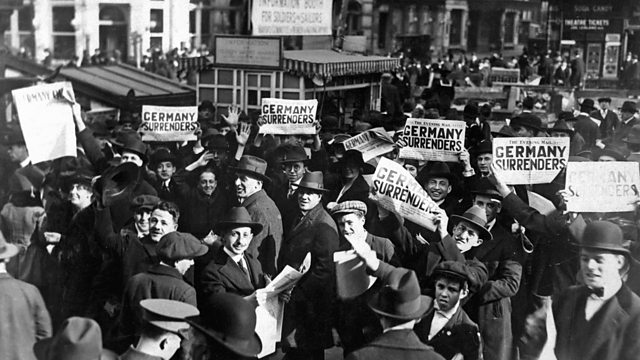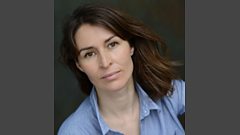
Aftermath
Texts and music reflecting a world changed by war, with readings by James Wilby and Helen Baxendale. With Elgar, Ravel, Tippett, Sassoon, Kipling, Pat Barker and Woodrow Wilson.
From shellshock to women's suffrage, homecomings to war memorials, the League of Nations to Spanish flu, a sequence of poems, prose and music reflecting a world changed by war. James Wilby and Helen Baxendale read poems by Sassoon, Whitman and Gurney and excerpts from Pat Barker, Woodrow Wilson and contemporary documents, while the music includes works by Elgar, Ravel and Tippett.
Last on
Music Played
Timings (where shown) are from the start of the programme in hours and minutes
-
Sebastian Faulks
Birdsong, read by James Wilby
![]() 00:01
00:01John Foulds
Requiem aeternam (A World Requiem)
Performer: Gerald Finley (baritone), Crouch End Festival Chorus, Philharmonia Chorus, ����ý Symphony Chorus, ����ý Symphony Orchestra, Leon Botstein (conductor).- Chandos CHSA5058.
- CD1 Tr1.
Letter by Private Charles T. Green, Kings Royal Rifle Corps
Read by James Wilby
![]() 00:11
00:11Bob Chilcott
Everyone Sang
Performer: Wellensian Consort, Christopher Finch (conductor).- Naxos 8.573158.
- Tr3.
William Alexander Percy
Poppy Fields France, 1918, read by Helen Baxendale
![]() 00:14
00:14Maurice Ravel
Fugue (from Le Tombeau de Couperin)
Performer: Steven Osborne (piano).- Hyperion CDA 677312.
- CD2 Tr2.
Ivor Gurney
To his Love, read by James Wilby
![]() 00:18
00:18Edward Elgar
Cello Concerto in E minor, Op. 85 (1st movement) (excerpt)
Performer: Jacqueline Du Pré (cello), London Symphony Orchestra, John Barbirolli (conductor).- EMI CDC 747 3292.
- Tr1.
Charlotte Mew
The Cenotaph, read by Helen Baxendale
![]() 00:27
00:27Gustav Holst
Ode to Death (excerpt)
Performer: London Symphony Chorus, Richard Hickox (conductor).- Chandos CHAN 2416.
- CD2 Tr10.
Woodrow Wilson
Speech in favour of the League of Nations. Pueblo, 25 September 1919 (excerpt). Read by James Wilby
![]() 00:35
00:35George and Ira Gershwin
The League of Nations (from Of Thee I Sing!)
Performer: New York Choral Artists, Orchestra of St Lukes, Michael Tilson Thomas (conductor).- CBS M2K 42522.
- CD2 Tr17.
Anna Eisenmenger
Blockade - The Diary of an Austrian Middle-Class Woman 1914-24, read by Helen Baxendale
![]() 00:39
00:39Dmitry Shostakovich
Symphony No. 12 'The Year 1917' (3rd movt) (excerpt)
Performer: Royal Liverpool Philharmonic Orchestra, Vassily Petrenko (conductor).- Naxos 8.572658.
- Tr6.
Anon
Influenza, read by Helen Baxendale
![]() 00:40
00:40Essie Jenkins
Influenza Blues
Performer: Essie Jenkins (voice).- Arhoolie CD510.
- Tr8.
Walt Mason
The Influenza, read by James Wilby
Siegfried Sassoon
Survivors, read by Helen Baxendale
![]() 00:45
00:45Bruce Springsteen
Turn out the Light
Performer: Bruce Springsteen.- Columbia 492 605 2.
- CD2 Tr17.
Gilbert Frankau
Peter Jameson - A Modern Romance, read by Helen Baxendale
![]() 00:51
00:51Yip Harburg & Jay Gorney
Brother, can you spare a dime?
Performer: Bing Crosby, Lennie Heyton and his orchestra.- ASV CDAJA 5183.
- Tr16.
Pat Barker
Tobys Room (excerpt), read by Helen Baxendale
![]() 00:00
00:00Benjamin Britten
Offertorium (from A War Requiem) (excerpt)
Performer: Philip Langridge (tenor), John Shirley-Quirk (baritone), Choristers of St Pauls Cathedral, London Symphony Chorus, London Symphony Orchestra, Richard Hickox (conductor).- Chandos CHAN 8983/4.
- CD1 Tr3.
Siegfried Sassoon
At the Cenotaph, read by James Wilby
![]() 01:04
01:04Michael Tippett
The world turns on its dark side (from A Child of Our Time)
Performer: London Symphony Chorus, London Symphony Orchestra, Colin Davis (conductor).- LSO LIVE LSO 0670.
- Tr1.
Walt Whitman
Reconciliation, read by James Wilby
Producer Note
For this final part of our trilogy of Words and Music in the Great War, we have followed on from ‘Outbreak’ and ‘Displacement’ to explore the legacy of war in ‘Aftermath’. It’s a big subject; indeed, who’s to say where it ends? Nearly 100 years after the First World War, we are still living in its shadow, rerunning it in our minds in an uneasy combination of fascination and horror. Its long political reach continues to shape our world today, and its emotional scars still haunt us.
To keep it within some sort of bounds, I’ve picked a clutch of issues that affected the first postwar decades. They include timelessly repeating states of mind such as mourning, reconciliation, hope for a better world and disillusionment, but also focus on others more specific to the decades following the Great War, such as the 1919 Spanish flu pandemic, shellshock and facial disfigurement.
Relief followed by mourning were understandably the most immediate reaction to the November 1918 armistice, and the programme opens with Sebastian Faulks’s memorable description of a dazed and drained Stephen Wraysford, the central character of his hugely popular novel Birdsong, surfacing from days trapped underground to find the war over and the battlefield deserted. Bob Chilcott’s choral setting of Siegfried Sassoon’s armistice poem Everyone Sang offers a more grateful response, if still tinged by sadness and regret. In between come the moving opening chorus of John Foulds’s solemnly pacifist World Requiem, composed in a rush of emotion in the last months of 1918, and first heard at a massive remembrance service in the Royal Albert Hall in 1923. There is also a short extract from a private soldier’s letter home, looking forward to a quiet homecoming with no questions.
Many minds were exercised in the immediate postwar period as to how the millions of war dead could most fittingly be memorialised. This was when the Tomb of the Unknown Soldier, the Commonwealth War Graves and several hundred village war memorials came into being – not without controversy, as it happens – and the poems I have chosen by William Alexander Percy, Ivor Gurney and Charlotte Mew, while earnest in their compassion, are each mindful in their own way of over-simplification of remembrance. They are complemented by musical elegiacs by Ravel, Elgar and Holst.
Hopes of a new and better world surface in a diary account by ‘An Austrian Middle-Class Woman’ documenting her son’s new-found egalitarianism, fired by anger at society’s upper echelons, and in a section from one of President Woodrow Wilson’s speeches in favour of the establishment of the League of Nations, an organisation which sadly failed to achieve its aims, and whose proposals, intended to put the brakes on irresponsible warmongering, today seem if anything further than ever from being realised.
What joy and relief there was at the end of hostilities was brief for some when a Spanish influenza pandemic took a further 50-100 million lives in 1918-9. The responses I have found to it may be essentially light-hearted, but it is black humour none the less.
Many who survived both war and flu, however, went on to live blighted lives, either as a result of shellshock, the condition now known as combat stress reaction which was only then beginning to be understood. Siegfried Sassoon saw shellshock sufferers at first hand during his own recuperation period at Craiglockhart War Hospital, and pictured them memorably in his poem ‘Survivors’, while Gilbert Frankau, an interwar campaigner for shellshocked servicemen, made one the eponymous main character of his novel Peter Jameson. Their evocations of the terrors that never go away, even when combat itself is a distant memory, are complemented by Bruce Springsteen’s post-Vietnam song Turn out the Light. A world where heroes’ deeds are soon forgotten and the little man overlooked once more is evoked in one of the 1930s’ most poignant popular songs, ‘Brother, can you spare a dime?’, before an extract from Pat Barker’s 2012 novel Toby’s Room depicts the shattered life of one of the many soldiers whose survival came at the expense of terrible and debilitating facial disfigurement.
After all this, and looking around at the constant state of conflict in the world today, it was hard to end in optimistic vein. The Offertorium from Benjamin Britten’s War Requiem, troped by Wilfred Owen’s poem outlining a tragic alternative ending to the Biblical story of Abraham and Isaac, hammers home how often we waste lives even when given the chance not to; Sassoon’s Cenotaph meditation reveals his fears for a dark future; and the opening chorus from A Child of our Time, Michael Tippett’s Second World War oratorio inspired by Nazi pogroms, bleakly depicts a world ‘turning on its dark side’. Yet I have at least chosen to end on a quiet note of hope, with a poem by Walt Whitman written in the aftermath of the American Civil War, celebrating one positive course that will always be open to us – reconciliation.
Lindsay Kemp
Producer
Broadcast
- Sun 6 Jul 2014 17:30����ý Radio 3
The hidden history of plant-based diets
Books website
Get closer to books with in-depth articles, quizzes and our picks from radio & TV.
Gallery



